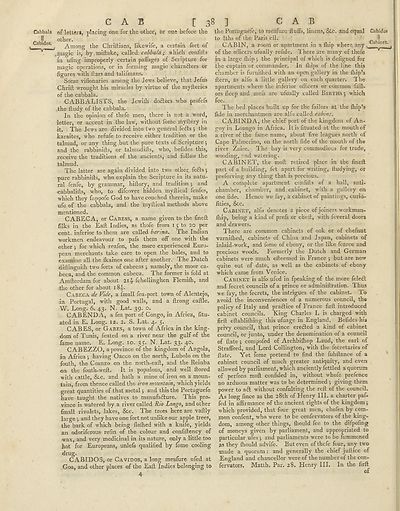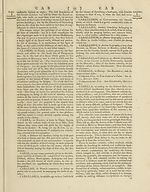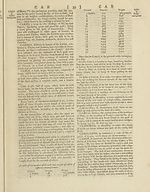Encyclopaedia Britannica, or, a Dictionary of arts, sciences, and miscellaneous literature : enlarged and improved. Illustrated with nearly six hundred engravings > Volume 5, BUR-CHI
(48) Page 38
Download files
Complete book:
Individual page:
Thumbnail gallery: Grid view | List view

CAB
t 38 ]
CAB
Cabidos.
Cabbala of letter*, placing one for the other, or one before the
other.
Among the Chriftians, likcwifc, a certain fort of
.magic is, by miltake, called cabbala; which confitb
in uling improperly certain paflages of Scripture for
magic operations, or in forming magic characters or
figures with liars and talifmans.
Some vilionaries among the Jews believe, that Jefus
Chrift wrought his miracles by virtue of the myfteriea
of the cabbala.
CABBALISTS, the Jewilh doctors who profefs
the ftudy of the cabbala.
In the opinion of thefe men, there is not a word,
letter, or accent in the law, without fome myftery in
it. The Jews arc divided into two general feCts ; the
karaites, who refufe to receive either tradition or the
talmud, or any thing but the pure texts of Scripture •,
and the rabbiniils, or talmudifts, who, befidcs this,
receive the traditions of the ancients, and follow the
talmud.
The latter are again divided into two other feCls 5
pure rabbinifts, who explain the Scripture in its natu¬
ral fenfe, by grammar, hiltory, and tradition 5 and
cabbalilts, who, to difeover hidden myltical fenfes,
which they fuppofe God to have couched therein, make
ufe of the cabbala, and the myilical methods above
mentioned.
CABECA, or Cabess, a name given to the Snell
filks in the Ealt Indies, as thofe from 15 to 20 per
cent, inferior to them are called barina. The Indian
workmen endeavour to pafs them off one with the
other ; for which reafon, the mere experienced Euro¬
pean merchants take care to open the bales, and to
examine all the Ikaines one after another. The Dutch
diilinguiih two forts of cabecas •, namely, the moor ca-
beca, and the common cabeca. The former is fold at
Amfterdam for about 21-^ fchellinghen Flemilh, and
the other for about 18-J.
Cabeca de Vide, a fmall fea-port town of Alentejo,
in Portugal, with good walls, and a Itrong caftle.
W. Long. 6. 43. N. Lat. 39. o.
CABENDA, a fea port of Congo, in Africa, fitu-
ated in E. Long. 12. 2. S. Lat. 4. 5. _
CABES, or Gabes, a town of Africa in the king¬
dom of Tunis, feated on a river near the gulf of the
fame name. E. Long. 10. 35. N.JLat. 33. 40.
CABEZZO, a province of the kingdom of Angola,
in Africa; having Oacco on the north, Lubolo on the
fouth, the Coanzo on the north-eaft, and the Reinba
on the fouth-well. It is populous, and well Itored
with cattle, &c. and hath a mine of iron on a moun¬
tain, from thence called the iron mountain, which yields
great quantities of that metal; and this the Portuguefe
have taught the natives to manufadture. This pro¬
vince is watered by a river called Rio Longo, and other
fmall rivulets, lakes, &c. The trees here are vaftly
large } and they have one fort not unlike our apple trees,
the bark of v'hich being llalhed with a knife, yields
an odoriferous refm of the colour and confillency of
wax, and very medicinal in its nature, only a little too
hot for Europeans, unlefs qualified by fome cooling
drug.
CABIDOS, or Cavidos, a long meafure ufed at
Goa, and other places of the Eall Indies belonging to
4
Cabinet.
the Portuguefe, to meafure fluffs, linens, &c, and equal Cabkfo*
to 4ths of the Paris ell.
CABIN, a room or apartment in a fhip where any _
of the officers ufually refide. There are many of thefe
in a large ffiip; the principal of which is defigned for
the captain or commander. In {hips of the line this
chamber is furniffied with an open gallery in the {hip’s
Hern, as alio a little gallery on each quarter. The
apartments where the inferior officers or common fail-
ors deep and mefs are ufually called Births j which
fee.
The bed places built up for the failors at the {hip’s
fldc in merchantmen are alfo called cabins.
CABINDA, the chief port of the kingdom of An-
goy in Loango in Africa. It is fituated at the mouth of
a river of the fame name, about five leagues north of
Cape Palmerino, on the north fide of the mouth of the
river Zaire. The bay is very commodious for trade,
wooding, and watering.
CABINET, the moll retired place in the fineft
part of a building, fet apart for waiting, ftudying, or
preferving any thing that is precious.
A complete apartment confifts of a hall, anti¬
chamber, chamber, and cabinet, with a gallery on
one fide. Hence we fay, a cabinet of paintings, curio-
fities, &c.
Cabinet, alfo denotes a piece of joiners workman-
fhip, being a kind of prefs or chcft, with feveral doors
and drawers.
There are common cabinets of oak or of chefnut
varniihed, cabinets- of China and Japan, cabinets of
inlaid-work, and fome of ebony, or the like fcarce and
precious w'oods. Formerly the Dutch and German
cabinets were much effeemed in France 5 but are now
quite out of date, as w'ell as the cabinets of ebony
which came from Venice.
Cabinet is alfo ufed in fpeaking of the more feledt
and fecret councils of a prince or adminiftration. Thus
w e fay, the fecrets, the intrigues of the cabinet. To
avoid the inconveniences of a numerous council, the
policy of Italy and practice of France firft introduced
cabinet councils. King Charles I. is charged with
firft eftablifiiing this ufuage in England. Belides hia
privy council, that prince erected a kind of cabinet
council, or junto, under the denomination of a council
of flate ; compofed of Archbifliop Laud, the earl of
Strafford, and Lord Collington, with the fecretaries of
ftatc. Yet fome pretend to find the fubftance of a
cabinet council of much greater antiquity, and even
allowed by parliament, which anciently fettled a quorum
of perfons moll confided in, without whofe prefence
no arduous matter was to be determined ; giving them
pow’er to a cl without confulting the reft of the council.
As long fince as the 28th of Henry 111. a charter pal¬
led in affirmance of the ancient rights of the kingdom •,
which provided, that four great men, chofen by com¬
mon confent, who w'ere to be confervators of the king¬
dom, among other things, ftiould fee to the difpofing
of moneys given by parliament, and appropriated to
particular ufes ; and parliaments were to be fummoned
as they {hould advife. But even of thefe four, any two
made a quorum : and generally the chief juftice of
England and chancellor u'ere of the number of the con¬
fervators. Matth. Par. 28. Henry III. In the firft;
of
t 38 ]
CAB
Cabidos.
Cabbala of letter*, placing one for the other, or one before the
other.
Among the Chriftians, likcwifc, a certain fort of
.magic is, by miltake, called cabbala; which confitb
in uling improperly certain paflages of Scripture for
magic operations, or in forming magic characters or
figures with liars and talifmans.
Some vilionaries among the Jews believe, that Jefus
Chrift wrought his miracles by virtue of the myfteriea
of the cabbala.
CABBALISTS, the Jewilh doctors who profefs
the ftudy of the cabbala.
In the opinion of thefe men, there is not a word,
letter, or accent in the law, without fome myftery in
it. The Jews arc divided into two general feCts ; the
karaites, who refufe to receive either tradition or the
talmud, or any thing but the pure texts of Scripture •,
and the rabbiniils, or talmudifts, who, befidcs this,
receive the traditions of the ancients, and follow the
talmud.
The latter are again divided into two other feCls 5
pure rabbinifts, who explain the Scripture in its natu¬
ral fenfe, by grammar, hiltory, and tradition 5 and
cabbalilts, who, to difeover hidden myltical fenfes,
which they fuppofe God to have couched therein, make
ufe of the cabbala, and the myilical methods above
mentioned.
CABECA, or Cabess, a name given to the Snell
filks in the Ealt Indies, as thofe from 15 to 20 per
cent, inferior to them are called barina. The Indian
workmen endeavour to pafs them off one with the
other ; for which reafon, the mere experienced Euro¬
pean merchants take care to open the bales, and to
examine all the Ikaines one after another. The Dutch
diilinguiih two forts of cabecas •, namely, the moor ca-
beca, and the common cabeca. The former is fold at
Amfterdam for about 21-^ fchellinghen Flemilh, and
the other for about 18-J.
Cabeca de Vide, a fmall fea-port town of Alentejo,
in Portugal, with good walls, and a Itrong caftle.
W. Long. 6. 43. N. Lat. 39. o.
CABENDA, a fea port of Congo, in Africa, fitu-
ated in E. Long. 12. 2. S. Lat. 4. 5. _
CABES, or Gabes, a town of Africa in the king¬
dom of Tunis, feated on a river near the gulf of the
fame name. E. Long. 10. 35. N.JLat. 33. 40.
CABEZZO, a province of the kingdom of Angola,
in Africa; having Oacco on the north, Lubolo on the
fouth, the Coanzo on the north-eaft, and the Reinba
on the fouth-well. It is populous, and well Itored
with cattle, &c. and hath a mine of iron on a moun¬
tain, from thence called the iron mountain, which yields
great quantities of that metal; and this the Portuguefe
have taught the natives to manufadture. This pro¬
vince is watered by a river called Rio Longo, and other
fmall rivulets, lakes, &c. The trees here are vaftly
large } and they have one fort not unlike our apple trees,
the bark of v'hich being llalhed with a knife, yields
an odoriferous refm of the colour and confillency of
wax, and very medicinal in its nature, only a little too
hot for Europeans, unlefs qualified by fome cooling
drug.
CABIDOS, or Cavidos, a long meafure ufed at
Goa, and other places of the Eall Indies belonging to
4
Cabinet.
the Portuguefe, to meafure fluffs, linens, &c, and equal Cabkfo*
to 4ths of the Paris ell.
CABIN, a room or apartment in a fhip where any _
of the officers ufually refide. There are many of thefe
in a large ffiip; the principal of which is defigned for
the captain or commander. In {hips of the line this
chamber is furniffied with an open gallery in the {hip’s
Hern, as alio a little gallery on each quarter. The
apartments where the inferior officers or common fail-
ors deep and mefs are ufually called Births j which
fee.
The bed places built up for the failors at the {hip’s
fldc in merchantmen are alfo called cabins.
CABINDA, the chief port of the kingdom of An-
goy in Loango in Africa. It is fituated at the mouth of
a river of the fame name, about five leagues north of
Cape Palmerino, on the north fide of the mouth of the
river Zaire. The bay is very commodious for trade,
wooding, and watering.
CABINET, the moll retired place in the fineft
part of a building, fet apart for waiting, ftudying, or
preferving any thing that is precious.
A complete apartment confifts of a hall, anti¬
chamber, chamber, and cabinet, with a gallery on
one fide. Hence we fay, a cabinet of paintings, curio-
fities, &c.
Cabinet, alfo denotes a piece of joiners workman-
fhip, being a kind of prefs or chcft, with feveral doors
and drawers.
There are common cabinets of oak or of chefnut
varniihed, cabinets- of China and Japan, cabinets of
inlaid-work, and fome of ebony, or the like fcarce and
precious w'oods. Formerly the Dutch and German
cabinets were much effeemed in France 5 but are now
quite out of date, as w'ell as the cabinets of ebony
which came from Venice.
Cabinet is alfo ufed in fpeaking of the more feledt
and fecret councils of a prince or adminiftration. Thus
w e fay, the fecrets, the intrigues of the cabinet. To
avoid the inconveniences of a numerous council, the
policy of Italy and practice of France firft introduced
cabinet councils. King Charles I. is charged with
firft eftablifiiing this ufuage in England. Belides hia
privy council, that prince erected a kind of cabinet
council, or junto, under the denomination of a council
of flate ; compofed of Archbifliop Laud, the earl of
Strafford, and Lord Collington, with the fecretaries of
ftatc. Yet fome pretend to find the fubftance of a
cabinet council of much greater antiquity, and even
allowed by parliament, which anciently fettled a quorum
of perfons moll confided in, without whofe prefence
no arduous matter was to be determined ; giving them
pow’er to a cl without confulting the reft of the council.
As long fince as the 28th of Henry 111. a charter pal¬
led in affirmance of the ancient rights of the kingdom •,
which provided, that four great men, chofen by com¬
mon confent, who w'ere to be confervators of the king¬
dom, among other things, ftiould fee to the difpofing
of moneys given by parliament, and appropriated to
particular ufes ; and parliaments were to be fummoned
as they {hould advife. But even of thefe four, any two
made a quorum : and generally the chief juftice of
England and chancellor u'ere of the number of the con¬
fervators. Matth. Par. 28. Henry III. In the firft;
of
Set display mode to:
![]() Universal Viewer |
Universal Viewer | ![]() Mirador |
Large image | Transcription
Mirador |
Large image | Transcription
Images and transcriptions on this page, including medium image downloads, may be used under the Creative Commons Attribution 4.0 International Licence unless otherwise stated. ![]()
| Permanent URL | https://digital.nls.uk/192984893 |
|---|
| Attribution and copyright: |
|
|---|
| Description | Ten editions of 'Encyclopaedia Britannica', issued from 1768-1903, in 231 volumes. Originally issued in 100 weekly parts (3 volumes) between 1768 and 1771 by publishers: Colin Macfarquhar and Andrew Bell (Edinburgh); editor: William Smellie: engraver: Andrew Bell. Expanded editions in the 19th century featured more volumes and contributions from leading experts in their fields. Managed and published in Edinburgh up to the 9th edition (25 volumes, from 1875-1889); the 10th edition (1902-1903) re-issued the 9th edition, with 11 supplementary volumes. |
|---|---|
| Additional NLS resources: |
|

